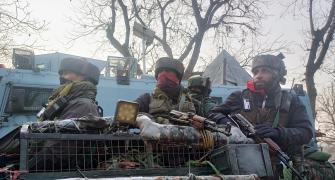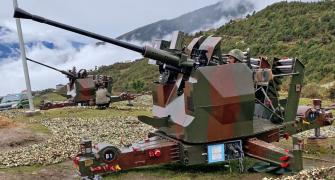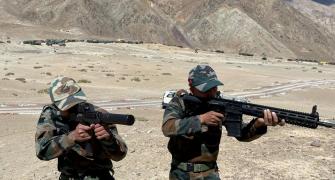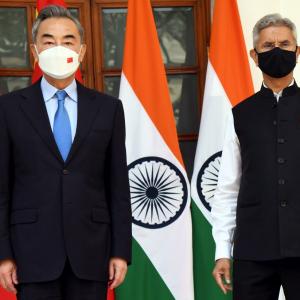The further expansion and upgrade of the Chinese military does not augur well for India, which continues to confront an increasingly belligerent China on its borders, notes former foreign secretary Shyam Saran.

At the recently concluded National People's Congress, China unveiled a new government and announced important shifts in its economic strategy in response to a more uncertain international economic environment and a slowdown in domestic drivers of growth.
For an export- and investment-led economy, the persistent slowdown in global economic growth, the retreat from open markets, and the denial of access to high technology such as semi-conductors are significant retardants.
There are structural factors at work, such as a declining and ageing population, the prospect of slower growth as the economy matures, and the persistent imbalance between investment and consumption and the rising income and wealth inequalities.
Under Xi Jinping, who has been confirmed, as expected, for a third five-year term as president, there had earlier been significant policy shifts to address some of these challenges.
For example, through his policy of 'dual circulation', the effort has been to prioritise domestic over external drivers of growth.
Through the 'common prosperity' objective, there has been a shift of emphasis from private sector-led growth to promoting state-owned enterprises.
The regulatory regime has been strengthened to curb what is described as excessive growth in capital and this has resulted in severe constraints on the country's highly successful tech companies and a virtual meltdown in the property sector, which has accounted for nearly 30 per cent of growth over several years.
All these problems have been magnified, thanks to the zero-Covid policy, which necessitated highly disruptive industrial lockdowns and the breakdown of supply chains.
Though the policy has now been abandoned and recovery has set in, it will take time for normalcy to return.
The Chinese economy registered its lowest growth in years at 3 per cent in 2022.
The National People's Congress has set a modest target of 5 per cent for the current year but even this may be ambitious in the current circumstances.
The geopolitical situation has not been favourable to China, either.
The confrontation with the US is sharpening and the issue of Taiwan is becoming a major and even dangerous fault line in China-US relations.
Xi Jinping mentioned the US by name for the first time when he accused it of leading a campaign of 'containment and suppression of China', which had 'brought unprecedented, severe challenges'.
Its strategic partner, Russia, is bogged down in its war in Ukraine and relations with Europe have worsened.
China's signature Belt and Road Initiative has stalled in various partner countries and there are mounting concerns over its pursuit of 'debt-trap' diplomacy.
But China has shown unexpected diplomatic agility in brokering peace between Saudi Arabia and Iran, long-time adversaries, and this may redraw the geopolitical map in the strategic region of the Gulf and West Asia.
This is the backdrop against which some key decisions have been unveiled by the new government, which is taking office.
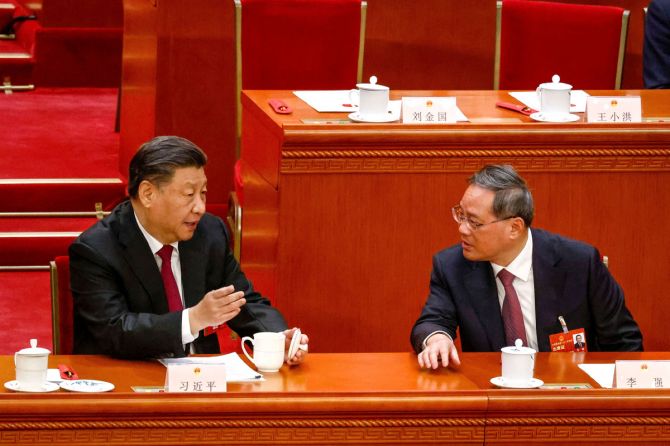
One, the direct authority and supervision of the Chinese Communist Party over governance have been extended further.
It will be recalled that several ministries and agencies under the State Council have been put directly under mixed party-State commissions, headed by Xi Jinping himself.
This process of centralisation and the exercise of direct party authority have now been taken further.
A new science and technology commission is being set up with larger funds allocated for R&D to promote technological self-reliance.
Xi Jinping has repeatedly said that technology will be the battleground of the future and China must aspire to a leading position.
This will be supported by a new data administration, housed in the national resource and development commission.
The data administration will collate, regulate, and provide access to the vast pools of data being generated through the digital economy.
This would promote innovation.
Given the growing importance of the financial and banking sectors, an overarching state financial regulatory commission is being set up.
This will not only subsume the existing banking and insurance regulator but will also take over some of the supervisory functions of the central bank, the People's Bank of China.
A national health commission will look after all health-related policies and their implementation.
Two, a visible effort has been made to assure the private sector of an even playing field vis-'-vis the ideologically favoured public sector.
Xi Jinping himself conveyed this assurance.
This has been reinforced by comments made by the new Premier, Li Qiang, in his press conference at the end of the NPC session.
Li Qiang said that concern over the treatment of the private sector was 'inappropriate'.
He described his own record of supporting the private sector during his service in the provinces of Zhejiang and Jiangsu and later in Shanghai, and said this policy had not changed and would not be changed.
However, there has been no reference to the crisis-ridden property sector, which continues to weigh down on the economy.
Li Qiang also conveyed the government's commitment to strengthening the role of Hong Kong as an international financial centre, though integrated more closely with the national economy; and three, the military budget has been increased by 7.6 per cent this year, a 0.5 percentage points increase over 2022.
This reflects the enhanced threat perception vis-'-vis the US.
In his press conference during the National People's Congress , new Foreign Minister Qin Gang warned that if the US did not change course, 'conflict and confrontation' between the two countries would become inevitable and the consequences would be 'catastrophic'.
Taiwan is obviously a key issue of concern and Qin Gang repeated what Xi Jinping has said earlier ' that Taiwan is 'the first red line that must not be crossed'.
The further expansion and upgrade of the Chinese military does not augur well for India, which continues to confront an increasingly belligerent China on its borders.
A worsening of China's relations with the US heightens Chinese concern about India's deepening military relations with the US and its participation in the 'Quad'.
China has often characterised the 'Quad' as an Asian North Atlantic Treaty Organization in the making, but directed against China.

Xi Jinping has consolidated his power as China's undisputed leader and put in place his loyal supporters in the party, state, and military hierarchies.
The party and State organs have been restructured to enable more centralised control with the party exercising a dominant role.
In foreign policy, China will double down on its close partnership with Russia, even as it attempts to repair its relations with Europe and enhance its engagement with the global South.
The brokering of the Iran-Saudi Arabia peace points to a more active diplomatic posture, which, too, may detract from India's G20 aspirations.
Shyam Saran is currently a honorary fellow at the Centre for Policy Research.


